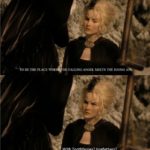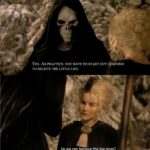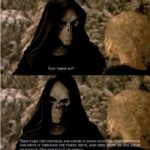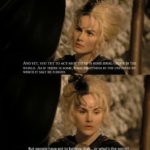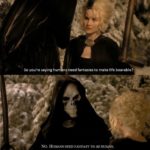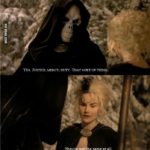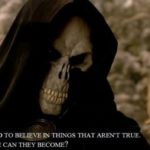“Witches just aren’t like that,” said Magrat. “We live in harmony with the great cycles of Nature, and do no harm to anyone, and it’s wicked of them to say we don’t. We ought to fill their bones with hot lead.“
The other two looked at her with a certain amount of surprised admiration. She blushed, and looked at her knees. “Goodie Whemper did a recipe,” she confessed. “It’s quite easy. What you do is, you get some lead, and you—”
“I don’t think that would be appropriate,” said Granny carefully, after a certain amount of internal struggle. “It could give people the wrong idea.”
“But not for long,” said Nanny wistfully.
– Wyrd Sisters, Terry Pratchett
I just saw somebody express disappointment that the new Watch show is intended to be “modern and inclusive”
buddy. friend. pal. half the goddamn series is about Vimes unlearning his prejudices and the other half is about Vimes’s extreme dislike of people who abuse their power. if anything I’m willing to bet they’ll tone it down out of cowardice
Samuel Vimes is the embodiment of “always punch up, never down” and if you missed that I’m not even sure we read the same books
I reserve the right to bludgeon anyone who complains about this with hardcover copies of Monstrous Regiment and Snuff.
Anyone who complains about the show being inclusive is going to get a visit from the ghost of Terry Pratchett, who is going to beat the stuffing out of them
With his meteor sword.
Over the course of the books, the Watch has acquired:
- a six-foot-tall cultural dwarf
- a werewolf
- an ex-‘splatter’ troll (like a bouncer, but hits harder)
- a openly female dwarf from a culture that severely frowns on that
- an ex-slave golem who set up an organisation to slowly buy the freedom of his people
- a friendly-but-determined religious missionary from a desert country named Visit-the-Infidel-with-Explanatory-Pamphlets
- a zombified revolutionary a-la Enjolras
- a forensic accountant poached from the Patrician
- a made-from-spare-parts mad scientist coroner
- Nobby Nobbs
Over the course of the same books, it has developed from your standard medieval fantasy gang-of-thugs city guards to an extremely modern police force containing:
- an alchemy-based forensics department
- an aeriel traffic corps
- a coroners office
- a forensic accountants department
- drug outreach programmes run by the ex-bouncer troll
- a general community policing model
It has gone from a three man graveyard of a force to a political powerhouse capable of taking on basically any real or political power on the Disc, and it has done so in large part because of the reputation of its commander as a man who will tackle any crime, at any level, against any opponent, up to and including ancient demons and the gods themselves, or even the commander himself, to protect the rights of any Joe Soap on the street to be an idiot without getting shafted for it.
I mean. ‘Modern and inclusive’ don’t even cover it, you know?
I’ve been on a Discworld re-read for about a year now, and it just struck me how Pterry gets progressively angrier and less subtle about it throughout the series.
Like, we start out nice and easy with Rincewind who’s on some wacky adventures and ha ha ha oh golly that Twoflower sure is silly and the Luggage is epic, where can I get one. Meanwhile Rincewind just wants to live out his boring days as a boring Librarian but is dragged along against his will by an annoying little tourist guy and honestly? Fuck this.
We get the first view of Sam Vimes, and he’s just a drunken beaten down sod who wants to spend his last days as a copper in some dive but oh fuck now he has to fight a dragon and honestly? Fuck this.
The first time we see Granny Weatherwax, she’s just a cranky old woman who has never set foot outside her village but oh fuck now she has to guide this weird girl who should be a witch but is apparently a wizard all the way down to Ankh Morpork and honestly? Fuck this.
Like, these books deal with grumpy, cranky people. But mostly, the early books are a lot of fun. Sure, they have messages about good and evil and the weirdness of the world, and they’re good messages too, but mostly they are just wacky romps through a world that’s just different enough that we can have a good laugh about it without taking things too much to heart.
But then you get to Small Gods, in which organized religion is eviscerated so thorouhgly that if it was human, even the Quisition would say it’s gone a bit too far while at the same time not condemning people having faith which is kind of an important distinction.
You get to Men at Arms and I encourage everybody with an opinion on the Second Amendment to read that one.
You get to Jingo, Monstrous Regiment, Going Postal (featuring an evil CEO who is squeezing his own company dry to get to every last penny, not caring one lick about his product or his workers or his customers or anything else and who, coincidentally, works out of Tump Tower. I’m not making this up).
And just when you think, whew, this is getting a bit much but hey, look, he wrote YA as well! And it’s about this cute little girl who wants to be a witch and has help from a lot of rowdy blue little men, this will be fun! A bit of a break from all the anger!
Wrong.
The Tiffany Aching books are the angriest of all. But you know what the great thing is?
The great thing is that Pterry’s anger is the kind of fury that makes you want to get up and do something about it. It upsets you, sure. But it also says It’s up to you to change all of this. And you can change all of this, and even if you can’t. Do it anyway. Because magicians have calculated that million-to-one chances crop up nine times out of ten.
It’s the kind of anger that gives you purpose, and it gives you hope. And that concludes my essay about why the Discworld series is so gloriously cathartic to read when it seems like all the world is going to shit.
So go. Read them, get angry and then get up and fight. Fight for truth. Justice. Freedom. Reasonably priced love and, most importantly, a hard-boiled egg.
GNU Terry Pratchett.
Pratchett went back to older throwaway jokes (like dwarves being apparently unisex) and used them as metaphors to discuss social change, racial assimilation, and other complex issues, while reexamining the species he’d thrown in at the margins of his world simply because they existed at the margins of every other fantasy universe. If goblins and orcs and trolls could think, then why were they always just there to be slaughtered by the heroes? And if the heroes slaughtered sentient beings en masse, how heroic exactly were they? It was a long overdue start on redressing issues long swept under the rug by a parade of Tolkien successors who never thought of anyone green and slimy as anything but a notch on the protagonist’s sword, and much of the urgency in Pratchett’s last few books seemed to be related to them. “There’s only one true evil in the world,” he said through his characters. “And that’s treating people like they were things.”
And in the last of his “grown-up” Discworld books, that idea is shouted with the ferocity of those who have only a few words left and want to make them count. Goblins are people. Golems are people. Dwarves are people, and they do not become any less people because they decide to go by the gender they know themselves to be instead of the one society forces on them. Even trains might be people, and you’ll never know one way or the other unless you ask them, because treating someone like they’re a person and not a thing should be your default. And the only people who cling to tradition at the expense of real people are sad, angry dwellers in the darkness who don’t even understand how pathetic they are, clutching and grasping at the things they remember without ever understanding that the world was never that simple to begin with. The future is bright, it is shining, and it belongs to everyone.
❤ :what is your favourite quote?
Oh. Oh, man. See, I can come up with a Discworld quote for almost any occasion.
One of the very best is definitely:
“
“The reason that the rich were so rich, Vimes reasoned, was because they managed to spend less money.
Take boots, for example. He earned thirty-eight dollars a month plus allowances. A really good pair of leather boots cost fifty dollars. But an affordable pair of boots, which were sort of OK for a season or two and then leaked like hell when the cardboard gave out, cost about ten dollars. Those were the kind of boots Vimes always bought, and wore until the soles were so thin that he could tell where he was in Ankh-Morpork on a foggy night by the feel of the cobbles.
But the thing was that good boots lasted for years and years. A man who could afford fifty dollars had a pair of boots that’d still be keeping his feet dry in ten years’ time, while the poor man who could only afford cheap boots would have spent a hundred dollars on boots in the same time and would still have wet feet.
This was the Captain Samuel Vimes ‘Boots’ theory of socioeconomic unfairness
”
“
“…William wondered why he always disliked people who said ‘no offense meant.’ Maybe it was because they found it easier to to say ‘no offense meant’ than actually to refrain from giving offense.” “ -The Truth
“
“Ah,“ said Mr Pin. “Right. I remember. You are concerned citizens.” He knew about concerned citizens. Wherever they were, they all spoke the same private language, where ‘traditional values’ meant ‘hang someone’.” -The Truth
“When people say “clearly” something that means there’s a huge crack in their argument and they know things aren’t clear at all.” – The Truth
““There’s no grays, only white that’s got grubby. I’m surprised you don’t know that. And sin, young man, is when you treat people as things. Including yourself. That’s what sin is.”
“It’s a lot more complicated than that—”
“No. It ain’t. When people say things are a lot more complicated than that, they means they’re getting worried that they won’t like the truth. People as things, that’s where it starts.”
“Oh, I’m sure there are worse crimes—”
“But they starts with thinking about people as things…”” -Carpe Jugulum
“All he knew was that you couldn’t hope to try for the big stuff, like world peace and happiness, but you might just about be able to achieve some tiny deed that’d make the world, in a small way, a better place.“ – The Fifth Elephant


